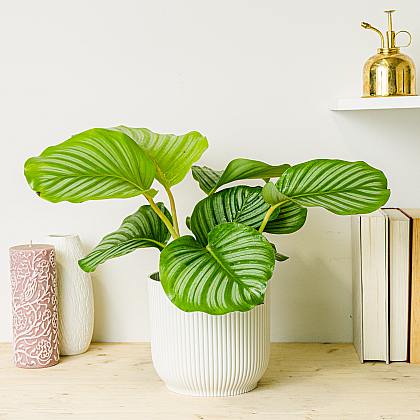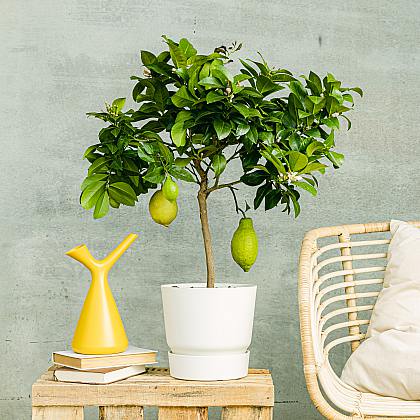Plants and terrariums: unique and long-lasting gifts for a child on their birthday
Plants and terrariums are unique and long-lasting gifts that can surprise any child on their birthday. Not only are they an original alternative to conventional toys, but they also have a very important educational and emotional value
Plants and terrariums are unique and long-lasting gifts that can surprise any child on their birthday. Not only are they an original alternative to conventional toys, but they also have a very important educational and emotional value. In this article, we'll explore the importance of plants in child development, as well as the benefits of having a mini ecosystem at home with a terrarium. In addition, we will talk about how plants can stimulate children's imagination and creativity, and how terrariums can be fun and educational DIY projects. We'll also share tips on caring for plants and terrariums, which can teach kids valuable lessons about responsibility and commitment. Join us on this journey into the world of plants and terrariums!
Plants: A Living and Educational Gift
Plants are a living, educational gift that can be a unique and long-lasting option for a child's birthday. By gifting a plant, we will not only be giving something tangible, but also the opportunity to learn about the nature and life cycle of plants. Children can observe how roots, stems, and leaves grow, thus understanding basic biological processes. In addition, caring for a plant will teach them about responsibility and commitment, as they will need to water it regularly, make sure it gets enough sunlight, and provide it with the necessary nutrients. This type of gift encourages respect for nature and the importance of taking care of our environment. It can also help children develop sensory skills, as they will be able to touch and feel the different textures of leaves and flowers. Likewise, by observing the growth and development of the plant over time, children will learn about patience and perseverance. In short, giving a plant to a child not only provides them with an enriching educational experience, but also allows them to connect with nature and develop values such as responsibility and respect for the environment.
Terrariums: Mini Ecosystems at Home
Terrariums are mini ecosystems at home that offer a unique and fascinating experience for children. These small encapsulated gardens allow children to learn about the nature and life cycle of plants in a fun and hands-on way. Terrariums are especially appealing to children because they can create their own magical world inside a jar. They can choose the plants, place stones, moss, and other decorative elements, and watch their own miniature ecosystem develop. In addition to being a source of entertainment, terrariums can also teach children important lessons about responsibility. Children need to learn how to take care of their plants, water them properly, and make sure they get the right amount of sunlight. These tasks teach them about the importance of care and responsibility towards other forms of life. Terrariums can also encourage children's creativity and imagination, as they can invent stories and adventures around their small gardens. In summary, terrariums are a great choice as a gift for a child's birthday, as they offer an educational, fun, and long-lasting experience that promotes a love of nature and responsibility towards the environment.
The Importance of Plants in Child Development
The Importance of Plants in Child Development
Plants play a critical role in child development, offering numerous educational and emotional benefits to children. First of all, by having plants in their environment, children learn about the importance of caring for and respecting nature. By observing how plants grow and develop, children gain knowledge about the life cycle of plants, photosynthesis, and other biological processes.
In addition, plants provide a relaxing and stimulating environment for children. Studies have shown that the presence of plants indoors improves concentration and reduces stress. The colors and textures of plants also stimulate children's senses, encouraging their creativity and imagination.
The plants also offer opportunities for children to engage in hands-on activities. By caring for plants, children learn about responsibility, teamwork, and patience. Watering them, pruning them, and watching them grow teaches them important lessons about life and caring for other living things.
In short, having plants in children's environment is beneficial for their overall development. Not only does it give them knowledge about the nature and life cycle of plants, but it also promotes their emotional well-being and teaches them valuable lessons about responsibility and care. Therefore, gifting a plant to a child is not only a lasting gift, but also a way to encourage their growth and learning.
Terrariums: A Magical World in a Jar
Terrariums are mini ecosystems at home that can be created in a glass jar. These magical worlds can be a great option to give a child on their birthday, as they allow them to have their own garden inside their room and explore nature in a safe and controlled way. In addition, terrariums are an excellent tool for teaching children about responsibility and caring for the environment. Children can learn about the life cycle of plants, how ecosystems work, and how to maintain a natural balance within the terrarium. Terrariums can also be customized with different types of plants, stones, mosses and other decorative elements to make them unique and reflect the child's personality. Kids can spend hours watching how plants grow, how different elements interact within the terrarium, and how the ecosystem changes over time. Additionally, terrariums can be a great option for keeping children occupied for long periods of time, as they require constant care and attention. In short, terrariums are a unique and long-lasting gift that is not only educational, but also fun and fascinating for children.
Plants That Stimulate Imagination and Creativity
Plants are unique and long-lasting gifts that can stimulate children's imagination and creativity. By having plants in their environment, children can learn to observe and appreciate the beauty of nature, which can spark their imagination and encourage their creativity. The different shapes, colors, and textures of plants can inspire children to create imaginary stories and characters. For example, a fern can turn into an enchanted forest inhabited by fairies and goblins, while a climbing plant can be the perfect setting for a jungle adventure. In addition, plants can also be used as decorative elements in crafts and art projects, allowing children to express their creativity through the design and elaboration of flower arrangements or miniature gardens. In short, plants are not only beautiful and alive, but they can also be a source of inspiration for children's imagination and creativity.
Terrariums as DIY Projects for Kids
Terrariums are a great choice as DIY projects for kids, as they allow them to unleash their creativity and learn about plant care at the same time. Creating a terrarium is a fun and educational activity that encourages imagination and exploration. Kids can choose the plants and decorative elements they want to include in their mini ecosystem, allowing them to customize it to their taste and style. In addition, building a terrarium is an activity that can be done as a family, which makes it an even more enriching experience.
To create a terrarium, you need simple materials such as a clear glass container, soil, stones, and moss. Children can collect some of these elements in the wild, which also gives them the opportunity to learn about the different types of rocks and plants. Once the terrarium has been created, children can be responsible for caring for it and keeping it healthy. This teaches them valuable lessons about responsibility and caring for the environment.
In short, terrariums are a great choice as DIY projects for kids because they are fun, educational, and easy to make with simple materials. They allow children to express their creativity while learning about caring for plants and the environment. In addition, they are a perfect activity to do as a family and promote teamwork.
Plant and Terrarium Care: Lessons in Responsibility
Taking care of plants and terrariums is a task that requires a lot of responsibility, especially when it comes to teaching this task to children. It is important that children understand the importance of keeping these plants and mini-ecosystems alive, and that they learn how to take proper care of them to prolong their useful life. In addition, caring for plants and terrariums can be an excellent opportunity to teach them important lessons about responsibility, patience, and perseverance. Children can learn to be responsible by assigning them specific tasks, such as watering plants or cleaning the terrarium. They can also learn patience by waiting for plants to grow and watching their mini ecosystem develop. Finally, they can learn about perseverance by overcoming challenges that may arise in the caregiving process, such as diseases or pests. Teaching children how to take care of plants and terrariums not only helps them develop practical skills, but also important values that will serve them well in their daily lives.
Plants and terrariums are unique and long-lasting gifts that can give children much more than just decoration. These living elements can teach them about responsibility, patience, and caring for our planet. In addition, plants and terrariums can stimulate children's imagination and creativity by creating a magical world within their home. It is important to highlight the importance of promoting environmental education from an early age, as this can have a positive impact on their cognitive and emotional development. By gifting a plant or terrarium to a child, we are offering them a unique opportunity to learn about nature and caring for the environment. What other ways are there to teach children about the importance of caring for the planet? It is important to continue reflecting on how we can involve children in this issue that is so relevant to the future of our planet


